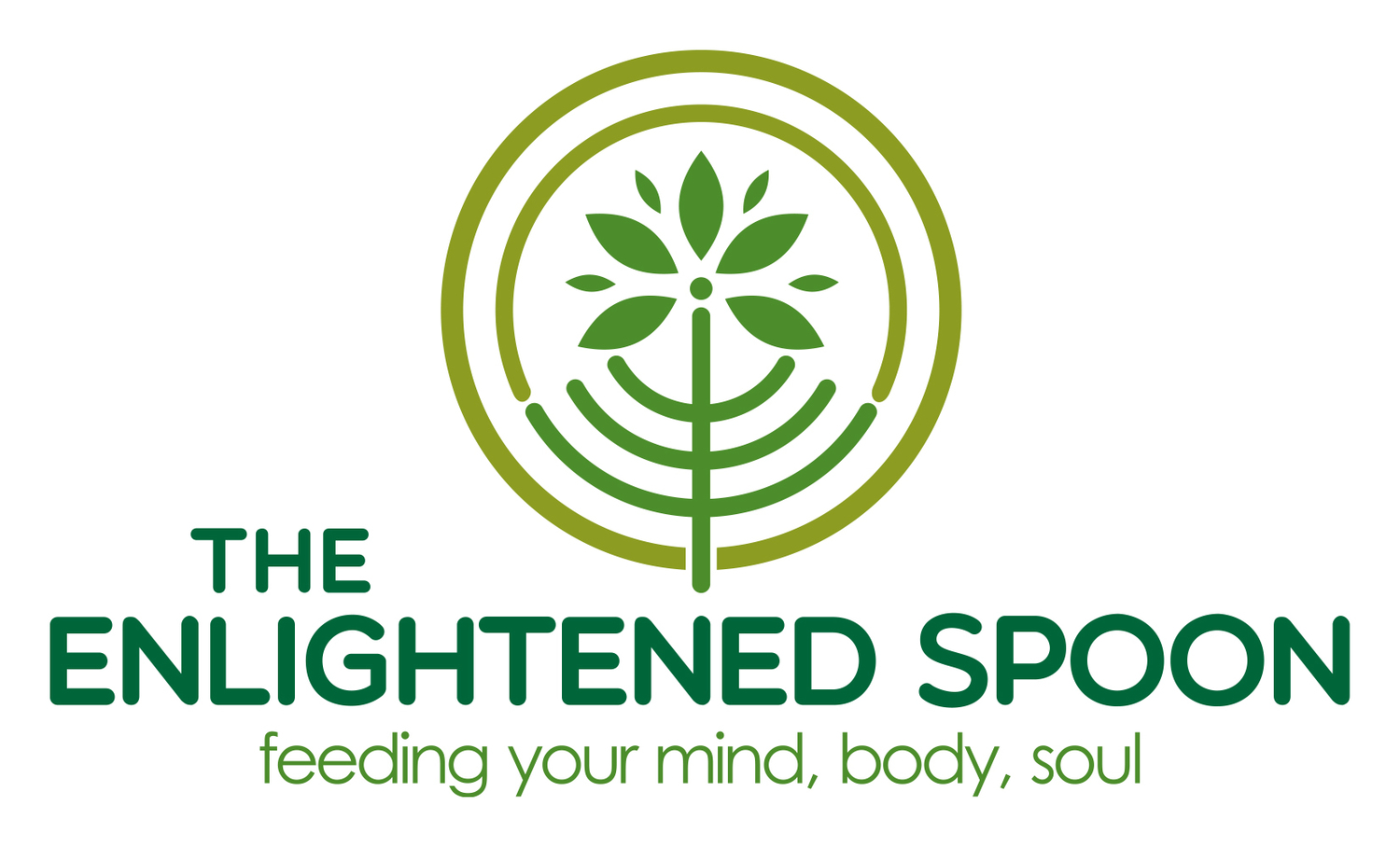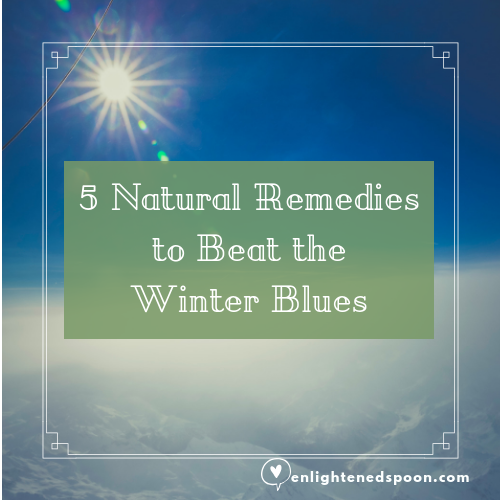5 Natural Remedies to Beat the Winter Blues
/Winter is naturally the time when your body needs more time to rest and restore itself. For some of us, this might mean a mild case of SAD, or “Seasonal Affective Disorder”, sometimes called the “winter blues”.
This is a very real thing and not to be taken lightly, and can also explain why you might be feeling more sluggish, tired, craving carbs or needing more sleep. [1]
If you are currently being treated medically with antidepressants, please consult with your healthcare practitioner before taking any of the supplements suggested below as some of these will have interactions with certain medications.
Here are 5 natural remedies you can use easily to help give yourself a bit of an energy boost during the upcoming winter months.
1. Magnesium
Magnesium is an important mineral required by every cell in your body to help create energy (amongst many other important cell functions). Unfortunately, it is really common that as much as 75% of the US adult population does not meet the US Food & Drug Administration’s recommended daily intake of 420mg elemental magnesium (according to the World Health Organization) [2].
With today’s busy, stressful lives, this issue is two-fold as we’re both not getting enough magnesium in our diets, and also losing/ using up lots of magnesium [3].
Nutritional Supplement:
We can supplement with a nutritional supplement - using Magnesium in citrate, bisglycinate or malate forms for better absorption, and taking up to 420mg of elemental magnesium [4}.
Foods High in Magnesium:
We can also eat more foods high in magnesium such as:
Dark green leafy vegetables, eg. spinach, swiss chard, broccoli.
Sea vegetables eg., seaweed, kelp, dulse, wakami.
Pumpkin seeds.
Nuts.
Dark chocolate. [4]
2. B complex
All the vitamin B’s work together and are required as co-factors in energy production in our cells, eg. vitamins B1-thiamine, B2-riboflavin, B3-niacin, B5-pantothenic acid, B6-pyridoxine, B7-choline, B9-folate, B12-cobalamin. [5]
Nutritional Supplement:
It is usually best to take the B vitamins formulated as a B-complex since these would include all the B vitamins in the correct recommended daily intake levels. [5]
Foods High in B vitamins:
We can also eat more foods high in the B vitamins such as:
Wild salmon (not farmed)
Dark green leafy vegetables eg. spinach, collard greens, swiss chard, broccoli.
Liver and other organ meats
Eggs
Legumes eg. lentils, chickpeas, black beans, edamame, green peas.
High quality grass-fed organic beef
High quality free-range chicken
Sunflower seeds [6]
3. Vitamin D
Vitamin D is best known for helping to build bones. However, it has an important role to play in mood regulation and brain function. Unfortunately, vitamin D deficiencies are becoming more common, since we are spending more time indoors and using more sunscreen whilst outdoors. One research study found that 70% of all adults and 67% of children, aged 1-11, don’t have adequate levels of vitamin D. [7]
As our bare skin (with no suncreen on) helps to make vitamin D with sunshine, it makes sense that in the winter months when we’re both bundled up and also when there are less daylight hours/ less sunshine in general, we will naturally have decreased levels of vitamin D.
Here are some ways to help boost your vitamin D levels:
Light therapy: buy a vitamin D sun lamp and use it between 10 - 30 minutes a day in the winter.
Go on a sunny holiday: this could either be a winter skiing trip or to a tropical beach where the sun shines daily.
Nutritional Supplement: take a vitamin D3 supplement (the active form of vitamin D) with a daily recommended intake of 600IU dose. [8]
Foods High in vitamin D: Eggs, mushrooms, wild fish (salmon, mackerel). [7]
4. Lemon balm
Lemon balm (Melissa Officinalis) has lots of uses, but one of its more well-known uses is as a remedy for mood and cognitive function. It helps relieve stress and reduce anxiety, which are some of the symptoms of SAD. [9]
Nutritional Supplement:
Lemon balm can be taken as a nutritional supplement - 2 grams per day, but do note it should only be used for short periods of time. You shouldn’t be taking lemon balm for more than 4 months without a break in between. [9]
Foods High in Lemon Balm:
You can also take lemon balm as a tincture tea - it’s a great calming tea before bedtime.
5. Saffron
Generally, the low moods resulting from SAD may be a result of lower levels of serotonin. Serotonin is a neurotransmitter mostly produced in the gut, so there are no foods that contain it. However, it is possible to eat foods with higher amounts of precursors to serotonin, like saffron, to help boost its production. [10]
Nutritional Supplement:
Saffron, like lemon balm, shouldn’t be taken continuously for more than 8 weeks at a time. For chronic use, supplement no more than 15mg per day. An acute, one-off dosage can go up to 200mg per day. [10]
Foods High in Saffron:
As one of the most expensive spices available, you can cook using saffron in your dishes - eg. Spanish paella or Moroccan tagine can be made with saffron as a flavour enhancer and mood-booster.
If you enjoyed reading this, you might also be interested in these previous posts:
[RECIPE]: Banana Bread - Gluten-free, Grain-free, Paleo, Keto-ish
Preview of January 2019’s 5 Good Things - Monthly tips to help start your new year right!
Like what you’re reading? Sign up to get on board the next edition of “5 Good Things To Share!” My monthly tips of the 5 things that can help you stay fit, healthy, happy including apps, books, fitness, gadgets, life hacks, podcasts, nutrition, quotes, travel, yoga. Find ideas and inspiration in search of the good life.
REFERENCES:
1. Rush Oak Park Hospital, Chicago. (2018). More Than Just the Winter Blues? .Available: https://www.rush.edu/health-wellness/discover-health/more-just-winter-blues
2. World Health Organization (2009). Calcium and Magnesium in Drinking Water - Public health significance. Available: http://apps.who.int/iris/bitstream/handle/10665/43836/9789241563550_eng.pdf;jsessionid=1559EA008606FAD641C818CBED5C44D1?sequence=1.
3. Christianson, A. (2018). 9 Reasons Magnesium Can Restore Your Energy Levels. Available: https://drchristianson.com/9-reasons-magnesium-can-restore-your-energy-levels/.
4. Jockers, D. (2017). What Is The Best Magnesium Supplement?. Available: https://drjockers.com/best-magnesium-supplement/.
5. Kubala, J. (2018). B-Complex Vitamins: Benefits, Side Effects and Dosage. Available: https://www.healthline.com/nutrition/vitamin-b-complex#overview.
6. McCulloch, M. (2018). 15 Healthy Foods High in B Vitamins. Available: https://www.healthline.com/nutrition/vitamin-b-foods#section1.
7. Rowe, K. (2018). How to Boost Your Mood With Vitamin D. Available: https://www.brainmdhealth.com/blog/how-to-boost-your-mood-with-vitamin-d/
8. National Institutes of Health, UK. (2018). Vitamin D: Fact Sheet for Professionals.Available: https://ods.od.nih.gov/factsheets/VitaminD-HealthProfessional/
9. Wilson, D. (2017). 10 Benefits of Lemon Balm and How to Use It. Available: https://www.healthline.com/health/lemon-balm-uses
10. Bongiorno, P. (2016). Saffron for Emotional Health. Available: https://www.psychologytoday.com/us/blog/inner-source/201601/saffron-emotional-health
11. Patel, K. (2018). Saffron. Available: https://examine.com/supplements/saffron/










